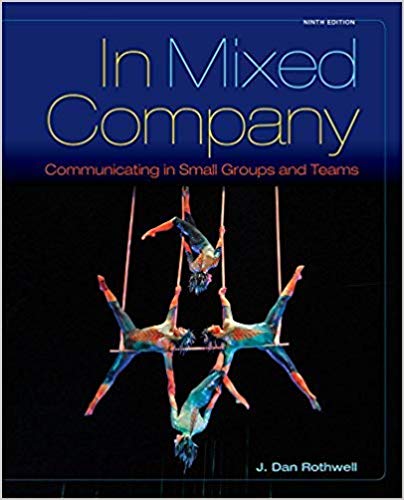Test Bank for In Mixed Company: Communicating in Small Groups 9th Edition
$35.00 Original price was: $35.00.$26.50Current price is: $26.50.
Test Bank for In Mixed Company: Communicating in Small Groups 9th Edition
Instant download Test Bank for In Mixed Company: Communicating in Small Groups 9th Edition pdf docx epub after payment.

Product details:
- ISBN-10 : 1285444604
- ISBN-13 : 978-1285444604
- Author: J. Dan Rothwell
With its popular narrative approach, market-leading IN MIXED COMPANY: COMMUNICATING IN SMALL GROUPS, 9th Edition combines solid theory, real-world examples, and cutting-edge research to deliver the latest coverage of small group communication. Following the central unifying theme of cooperation, the book uses the communication competence model to guide discussions of key small group concepts and processes. It includes systems theory as a key theoretical component as well as emphasizes the role of power in small group communication. Business-oriented and workplace examples, surveys, and studies bring chapter concepts to life. Expansive coverage of group roles includes detailed discussions of the types of informal group roles as well as comprehensive explanations of task, maintenance, and disruptive roles. In addition, insightful discussions of technology and its influence on small group communication is integrated throughout.
Table of contents:
- 1 Communication Competence in Groups
- Myths about Communication
- Myth 1: Communication Is a Cure-All
- Myth 2: Communication Can Break Down
- Myth 3: Effective Communication Is Merely Skill Building
- Myth 4: 93% of Meaning Is Communicated Nonverbally
- Myth 5: Effective Communication Is Just Common Sense
- Communication Defined
- Communication as Transactional: Mutually Influential
- Communication as a Process: The Continuous Flow
- Communication as Sharing Meaning: Making Sense
- Verbal Communication: Telling It Like It Isn’t
- Nonverbal Communication: Wordless Meaning
- Communication Competence
- Effectiveness: Achieving Goals
- A Matter of Degree: From Deficiency to Proficiency
- We (Not Me) Oriented: Primacy of Groups
- Appropriateness: Following the Rules
- Rule Violations: Consequential Effects
- Rule Changes: Context Specific
- Achieving Communication Competence
- Knowledge: Learning the Rules
- Skills: Showing, Not Just Knowing
- Sensitivity: Receptive Accuracy
- Commitment: A Passion for Excellence
- Ethics: The Right and Wrong of Communication
- Culture and Communication Competence
- Individualism–Collectivism Dimension: The Prime Directive
- Applying the Communication Competence Model: Several Steps
- Definition of a Group
- Groups: More than People Standing at a Bus Stop
- Interpersonal Communication and Public Speaking: Ungroups
- TED Talks and YouTube Videos
- Video Case Studies
- American Factory (2019). Documentary; TV-14
- Brooklyn (2015). Drama/Romance; PG-13
- Crazy Rich Asians (2018). Drama/Romance/Comedy; PG-13
- The Hunger Games: Catching Fire (2013). Action-Adventure; PG-13
- Return to Paradise (1998). Drama; R
- List of Key Terms
- 2 Groups as Systems
- Interconnectedness of Parts
- Ripple Effect: A Chain Reaction
- Synergy: One Plus One Equals a Ton
- Negative Synergy: Results Beyond Bad
- Adaptability to a Changing Environment
- Dynamic Equilibrium: Regulating Stability and Change
- Dealing with Difficult Group Members: Disruptive Change
- Boundary Control: Communication Methods for Regulating Input
- Physical Barriers: Protecting Group Space
- Psychological Barriers: Member in Name Only
- Linguistic Barriers: Having to Speak the Language
- Rules: Permission Not Granted
- Roles: Staying in Bounds
- Networks: Controlling Information and Interaction Flow
- Open and Closed Systems: Setting Effective Boundaries
- Influence of Size
- Group Size and Complexity
- Quantitative Complexity: Exponentially Complicated
- Complexity and Group Transactions: Size Matters
- An Organization: A Group of Groups
- TED Talks and Youtube Videos
- Video Case Studies
- City Island (2010). Comedy/Drama; PG-13
- Contagion (2011). Drama; R
- The Host (2013). Adventure/Sci-Fi/Romance; PG-13
- The Post (2017). Drama/History; PG-13
- Wonder (2017). Drama; PG
- List of Key Terms
- 3 Meetings: Standard and Virtual
- Standard Meeting Preparation
- Clarify the Purpose: Avoid Aimlessness
- Create an Effective Meeting Agenda: Simple Steps
- Get There First: Expect Problems
- Conducting a Meeting
- Type of Meeting: Formal or Informal
- Begin on Time; End on Time: Punctuality Is a Virtue
- Communicate Ground Rules: Avoid Chaos
- Use the Best Process: No One-Size-Fits-All
- Stay on Track: Parking Lots, Jellyfish, and Perception Checks
- Concluding the Meeting: Don’t End with a Whimper
- After the Meeting: Clean-Up Time
- Participating in Meetings
- Be Prepared: Don’t Act Like a Potted Plant
- WAIT: Avoid Stage Hogging
- Be Attentive: Monitor Your Nonverbal Communication
- Recognize Cultural Diversity: Is Silence Golden?
- Increase Participation: Constructive Engagement
- Virtual Meetings
- Types of Virtual Meetings: Audio and Visual
- Pros and Cons: A Mixed Bag
- Facilitating a Virtual Meeting: New Challenges
- Virtual Meeting Participation: A Few Unique Considerations
- TED Talks and YouTube Videos
- Video Case Studies
- The Hobbit: An Unexpected Journey (2012). Adventure/Fantasy; PG-13
- Moneyball (2011). Biography/Drama; PG-13
- List of Key Terms
- 4 Group Development
- Primary Dimensions of Groups
- Task and Social Dimensions: Working and Relating
- Building Cohesiveness: Bringing Us Together
- Encourage Compatible Membership
- Develop Shared Goals
- Accomplish Tasks
- Develop a Positive History of Cooperation
- Increase Proximity
- Nurture Virtual Group Social Relations
- Periodic Phases of Group Development
- Forming: Gathering Members
- Reasons We Join Groups: Motivation
- Member Diversity: The Benefits and Challenges of Difference
- Storming: Feeling the Tension
- Primary Tension: Initial Uneasiness
- Secondary Tension: Later Stress and Strain
- Norming: Regulating the Group
- Types of Norms: Explicit and Implicit
- Degree of Conformity: Strength of Group Pressure
- Why We Conform: Fitting In
- Conditions for Conformity: When We Bow to Group Pressure
- Addressing Nonconformity: When Groups Get Tough
- Performing: Group Output
- Motivation to Perform: Social Loafing and Social Compensation
- When Groups Outperform Individuals: Three Heads Are Better than One
- When Individuals Outperform Groups: No Group Magic
- TED Talks and YouTube Videos
- Video Case Studies
- Easy A (2010). Comedy; PG-13
- Hacksaw Ridge (2016). Drama, Biography; R
- Lord of the Flies (1963). Drama; NR
- Lord of the Rings: The Fellowship of the Ring (2001). Drama; PG-13
- The Croods (2013). Animated comedy; PG
- List of Key Terms
- 5 Developing the Group Climate
- Positive versus Negative Climates
- Negativity Bias: Short-Circuiting a Positive Climate
- Positive Emphasis: The “Magic Ratio”
- Competition and Cooperation
- Definitions: Conceptual Clarity
- Constructive Competition: Tempering Hypercompetitiveness
- Cooperative Group Climates: Cultivating Positivity
- Communication and Group Climate
- Praise and Recognition: Basic Building Blocks
- Defensive and Supportive Communication: Shaping Climates
- Criticism versus Description
- Control versus Problem Orientation
- Manipulation versus Assertiveness
- Indifference versus Empathy
- Superiority versus Equality
- Certainty versus Provisionalism
- Incivility versus Civility
- Listening: Enhancing Positivity
- Shift Response versus Support Response: Focusing on Me or Thee
- Competitive Interrupting: Seizing the Floor
- Ambushing: Preparing Rebuttals
- Virtual Group Climate
- TED Talks And Youtube Videos
- Video Case Studies
- August: Osage County (2013). Drama; R
- Authors Anonymous (2014). Comedy; PG-13
- Girls Trip (2017). Comedy; R
- Paddington 2 (2018). Animated Comedy/Adventure; PG
- Who’s Afraid of Virginia Woolf? (1966). Drama; R
- List of Key Terms
- 6 Roles in Groups
- Influence of Roles
- Role Status: Playing by Hierarchical Rules
- Role Conflict: Torn Between Two Roles
- Role Reversal: When Students Become Teachers
- Types of Roles
People also search:
In Mixed Company: Communicating in Small Groups 9th Edition
In Mixed Company: Communicating in Small Groups 9th Edition pdf
In Mixed Company: Communicating in Small Groups
what is small group communication
|
which is the type of communication in small group
|
|
how should you communicate in small groups
|
You may also like…
Solution Manual
Groups Process and Practice Corey 9th Edition Solutions Manual
Solution Manual
Solution Manual for Lakeside Company Case Studies in Auditing 12th Edition by Trussel












